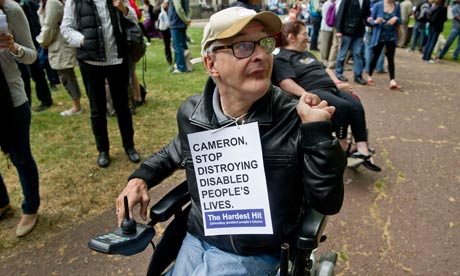The government’s proposals to ‘reform’ welfare will punish the disabled. We must not abandon the concept of a fair society

The Hardest Hit march by disabled people received a fraction of the coverage of similar protests against government cuts. Photograph: Sarah Lee for the Guardian
I watched footage of the Hardest Hit march with a mixture of admiration and sadness. Despite being considerably larger, it got a fraction of the coverage of the shambolic “Rally Against Debt“. Perhaps it was because it’s simply too painful to watch? One protester suggested it could be called “Britain’s March of Shame”. I certainly felt ashamed.
Like many of you reading this, I would have had a great deal of sympathy with the protesters but very little understanding of what they were actually going through. That changed when I was diagnosed with cancer earlier this year and told I had months to live. In a previous article, I wrote about my experiences and my attempts to shame policymakers into making welfare more fair and more just.
The current government’s proposals to “reform” welfare are yet to be passed into law and while aspects of them have proved controversial, little has been written about the personal independence payment (PIP) which is proposed to replace disability living allowance. My earlier article was critical of the delay claimants faced between suffering a disability or illness and actually receiving financial support. Under the old system, claimants would have to meet the criteria for three months before receiving payment (which was not backdated). I felt this was scandalous. PIP addresses this issue – by extending this period to six months, which is downright cruel.
After repeated attempts to reach Iain Duncan Smith I finally received a response from Maria Miller, the minister for disabled people, through my MP, regarding why payments are not backdated. Miller argued that there is an “inherent difficulty in gathering and assessing evidence in respect of a period earlier than the date of claim”. Really? Surely a simple note from the applicant’s specialist would suffice – they have to sign the application anyway.
To date I still haven’t received an explanation as to why the government is extending the criteria period from three to six months, but according to the DWP it will “establish long-term disability within the context of a cash benefit paid to contribute towards the extra costs of disability”. The proposed extension is for all long-term disabilities with the very specific exception of the terminally ill with a life expectancy less than six months. How an arbitrary increase to the qualifying period will ensure this – instead of expert medical opinion – is anybody’s guess.
Yet some have questioned whether this is a matter for the state at all. After my last article someone said that while they sympathised with my predicament I should have had insurance in order to protect myself rather than depend upon the taxpayer for support. Another poster pointed out that I had paid into such a scheme – it was called national insurance. Interestingly, national insurance is to be quietly done away with, and perhaps the hope is that the perceived right to state support will go with it.
My condition meant I was able to represent a rarely heard perspective and despite requests from BBC radio in Manchester and Sheffield, the government was not prepared to have a representative debate with me on this issue. Why? Because its policy is simply indefensible.
The powers that be know this small level of critical exposure is meaningless if public support is not mobilised in the same way it was in objection to the selling off of our national forests or the outsourcing of the NHS. Together we can make a difference, for the better. But can we afford to have a fairer society in today’s economic climate? Of course we can. The more pressing question would be: can we afford not to?

No responses yet